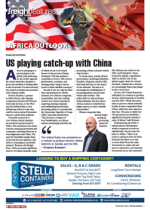A c ontinent-wide “ports race” could have long-term negative political, social and economic impacts, warn Ricardo Reboredo, Assistant Professor, Metropolitan University, Prague and Elisa Gambino, Fellow, Department of International Relations, London School of Economics and Political Science in an article for The Conversation.Between 2004 and 2019, over $50 billion was spent on African port infrastructure – roughly 13 times more than was spent between 1990 and 2004.“In essence, the ports race is the result of both new alliances between African political elites and global economic circumstances that favour large-scale infrastructure building.“For some countries, port construction or expansion may enhance the implementation of industrial policy frameworks by reducing transport costs and inefficiencies.“Yet this is not a given.“Construction of multiple ports in the same region attempting to gain the status of transhipment or gateway ‘hubs’ means that some will certainly fall short.“There will be severe political and economic consequences,” they warn.The authorshave identified three “Africa-specific” macro trends.The first is reliance on the large-scale export of natural resources (“extractivism”).The second is an embrace of state-led development strategies that privilege large-scale infrastructure.Third is the repackaging of narratives that link economic growth and global connectivity.“Elites do this to bolster their domestic power and legitimise processes that are often socially or environmentally destructive.“The ports race is symptomatic of a new pattern in national development.“African politicians are aiming to use the export of unprocessed resources and commodities to develop pockets of domestic value-addition in certain strategic industries.“This strategy has become ubiquitous under the umbrella of ‘resource-led development’.“Yet it creates the conditions for the continued plunder of African resources and for hugely environmentally or socially damaging processes.”They are critical of the introduction of “safe spaces” in the form of development zones which are cut off from the rest of the country.They cite Djibouti as an example. It has attracted over $4 billion for infrastructure development in the past decade.“Yet, this has done little to reduce Djibouti’s poverty rates or improve employment levels.“The domestic stability needed to attract capital to Djibouti was realised through the erosion of press freedoms, harsh crackdowns on dissent and non-competitive elections.“It is in the alliance between the interests of local political elites and foreign capital that the developmental effects of port projects are defined.”Without a strong business case to support them, port developments can lead to increased debt.“The economic and politicalconsequences of costly infrastructure projects falling short in delivering growth and development can be disastrous.”

